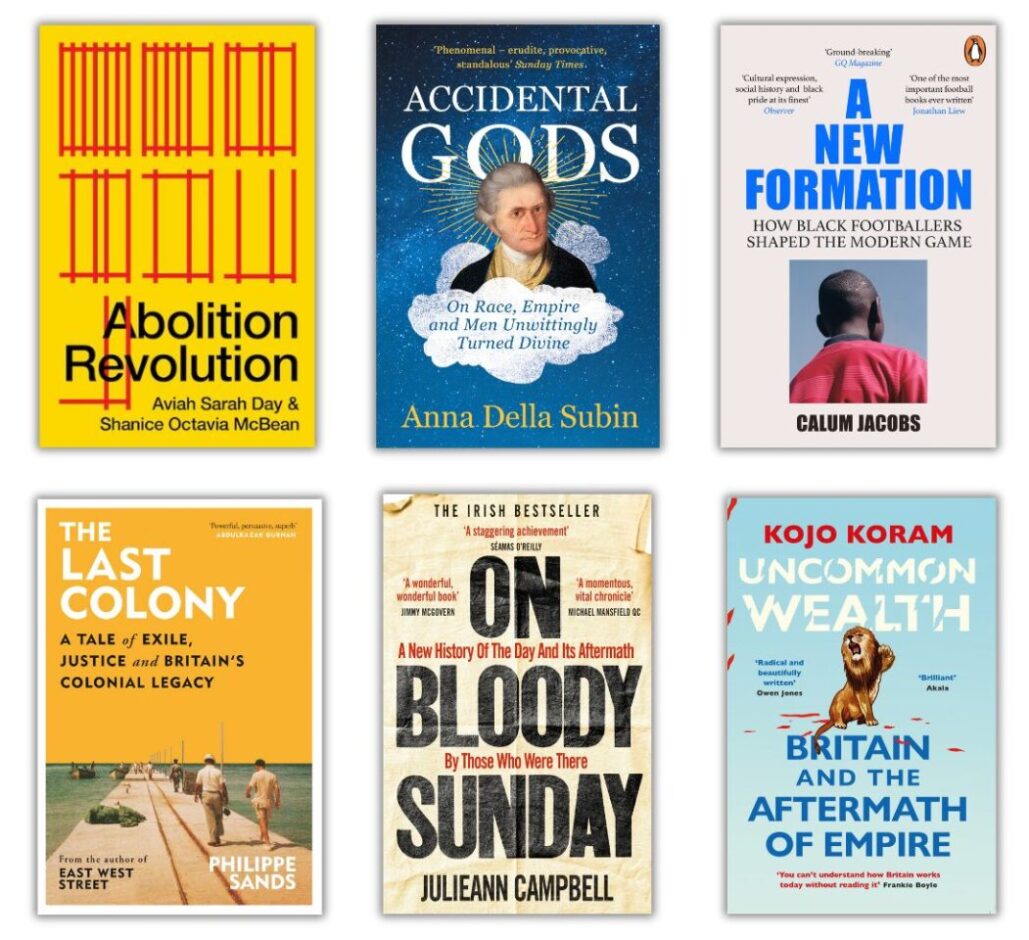
English PEN announces the six shortlisted titles for the PEN Hessell-Tiltman Prize 2023 .
The prize, endowed by former PEN member Marjorie Hessell-Tiltman’s bequest, celebrates the best non-fiction on any historical subject.
The 2023 shortlist is:
Abolition Revolution by Aviah Sarah Day and Shanice Octavia McBean (Pluto Press)
Accidental Gods: On Race, Empire and Men Unwittingly Turned Divine by Anna Della Subin (Granta)
A New Formation: How Black Footballers Shaped the Modern Game by Calum Jacobs (Merky Books)
The Last Colony: A Tale of Exile, Justice and Britain’s Colonial Legacy by Philippe Sands (Weidenfeld and Nicolson)
On Bloody Sunday: A New History Of The Day And Its Aftermath By Those Who Were There by Julieann Campbell (Monoray)
Uncommon Wealth: Britain and the Aftermath of Empire by Kojo Koram (John Murray Press)
This year’s judging panel for the PEN Hessell-Tiltman Prize is chaired by academic Dan Hicks. He is joined by environmental humanities scholar and art historian Sria Chatterjee, and artistic director of the Migration Museum, Aditi Anand.
The winner will be announced on 22 November 2023 at a ceremony held at the Bodleian Libraries’ Weston Library in Oxford. Richard Ovenden, Bodley’s Librarian, will address the audience before the seven shortlisted authors read from their nominated books and appear in conversation with the judges. The evening will end with the announcement of the 2023 prize winner, followed by a drinks reception and an opportunity to buy all of the shortlisted titles.
Zoe Sadler, Events and Prizes Manager at English PEN said: “This year’s shortlist is compelling, impressive, and illuminating, highlighting the power and vitality of historical writing and the important diversity of subjects and perspectives that it can uncover. It was fascinating to hear the judges’ profound and thoughtful discussions which led to such a brilliant list.”
The panel said:
Abolition Revolution: “This is a fast-paced book about an unfinished struggle that runs from policing and prisons to schools and workplaces, and into communities and everyday life. Abolition Revolution rewires our collective understanding of the enduring historical connections between racism, criminalisation, and imperialism. In doing so, it offers a radical vision of hope and liberation.”
Accidental Gods: On Race, Empire and Men Unwittingly Turned Divine: “With impressive range and density, Accidental Gods details stories of men who have been worshipped as gods often against their will. In her account, Subin highlights the strange paradoxes of the instinct to deify and the messy histories it unspools.”
A New Formation: How Black Footballers Shaped the Modern Game: “Bringing together a range of voices, A New Formation offers a fresh approach to telling the histories of Black footballers and wider Black British experiences. Moving beyond the familiar tropes of racism and anti-racism, this insightful volume of essays instead seeks to reveal the complexity of Black British footballer lives and what they mean to people on and off the pitch.”
The Last Colony: A Tale of Exile, Justice and Britain’s Colonial Legacy: “In exploring the little-known story of Chagos islanders who were forcibly deported from their homeland by the UK, Phillipe Sands compels us to reckon with the injustices of Britain’s colonial past – and present. It is a gripping story told with great empathy and care for people who have fought for decades for self-determination and justice.”
On Bloody Sunday: A New History Of The Day And Its Aftermath By Those Who Were There: “Raw, meticulous and deeply personal, On Bloody Sunday is a remarkable act of public memory. The book gathers hundreds of different voices in testimony and reflection, retelling the unresolved story of the massacre of unarmed civilians in 1972. In doing so it expands the possibilities of oral history as a resource for truth and justice.”
Uncommon Wealth: Britain and the Aftermath of Empire: “Uncommon Wealth is a rare treasure. It shows us, in lucid, engaging prose, how our current economic crises in Britain and inequalities across the globe are bound up in and impacted by the aftermath of empire.”